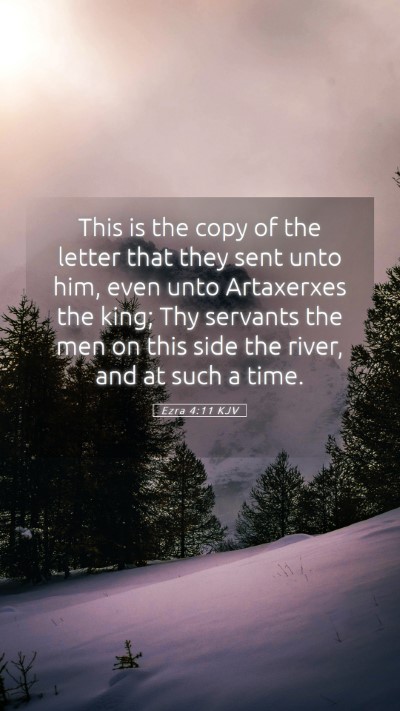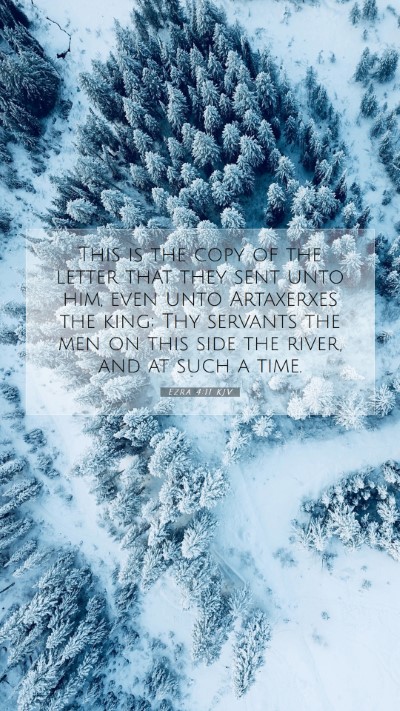Old Testament
Genesis Exodus Leviticus Numbers Deuteronomy Joshua Judges Ruth 1 Samuel 2 Samuel 1 Kings 2 Kings 1 Chronicles 2 Chronicles Ezra Nehemiah Esther Job Psalms Proverbs Ecclesiastes Song of Solomon Isaiah Jeremiah Lamentations Ezekiel Daniel Hosea Joel Amos Obadiah Jonah Micah Nahum Habakkuk Zephaniah Haggai Zechariah MalachiEzra 4:11 Meaning
What is the meaning of Ezra 4:11?
This is the copy of the letter that they sent unto him, even unto Artaxerxes the king; Thy servants the men on this side the river, and at such a time.
Ezra 4:11 Bible Verse Meaning
Bible Verse Commentary: Ezra 4:11
Ezra 4:11: "This is the copy of the letter that they sent unto him, even unto Artaxerxes the king; Thy servants, the men on this side the river, and at such a time."
Meaning and Interpretation
The context of Ezra 4:11 involves a letter sent to King Artaxerxes by the adversaries of the returning Jewish exiles. Their intent was to alert the king about the rebuilding efforts in Jerusalem and to portray those endeavors in a negative light.
- Authority and Governance: This verse highlights the power dynamics between the local population and the governing authorities. The adversaries seek to influence the king's perception and decisions regarding the rebuilding efforts.
- Conflict with Purpose: The letter represents opposition against a divine mission—reestablishing the temple and city of Jerusalem. It's a reminder that the path of faith often encounters challenges and resistance.
- Communication as a Tool: The act of writing a letter signifies the importance of clear and formal communication in advocating for one's cause. It remains a relevant principle in both governance and personal affairs.
Commentary Insights
In reviewing public domain commentaries, various insights emerge regarding the implications of this verse:
- Matthew Henry emphasizes the illustration of human attempts to undermine God’s work through worldly methods. Henry notes the significance of the phrase “this is the copy of the letter,” which indicates formality and intent in challenging the progress of God's people.
- Albert Barnes asserts that this verse reflects a strategic maneuver from the adversaries, showcasing their efforts to persuade the king against the Jews. This behavior highlights the perennial struggle faced by God's people throughout Scripture and history.
- Adam Clarke provides historical context, explaining the political landscape of the time and how local rulers would often feel threatened by rejuvenation efforts, which could imply a restoration of power and life for the people.
Historical Context
Understanding the historical context of this verse is crucial for deeper appreciation:
- Ezra was a scribe and leader who played an essential role in the return of the Israelites from Babylonian captivity. His mission involved not only rebuilding the temple but reinstating proper worship and societal order.
- The rebuilding of Jerusalem was a direct fulfillment of God's promises, yet it was met with fierce opposition. The letter serves as a reminder that spiritual and physical endeavors often attract adversity.
Application and Relevance
In applying the lessons from Ezra 4:11, we can draw practical insights for today’s readers:
- When pursuing God-given tasks, be prepared for opposition. The adversaries may come in various forms, whether as external critics or internal doubts.
- Effective communication is critical, particularly when advocating for truth and righteousness. Be diligent in articulating your purpose clearly.
- Understand that God’s plans often unfold amidst challenges. Trusting in His providence and timing can fortify one's resolve against discouragement.
Cross References
For a more comprehensive understanding, consider these related Bible verses:
- Nehemiah 4:1-3: Details the ridicule and contempt faced by Nehemiah during the rebuilding of Jerusalem's walls.
- Ezra 5:11: An account of how the exiles responded to opposition by affirming their purpose in God's plan.
- Isaiah 53:3: A prophetic view of how the righteous often face rejection and scorn, encapsulating the essence of opposition in faith.


